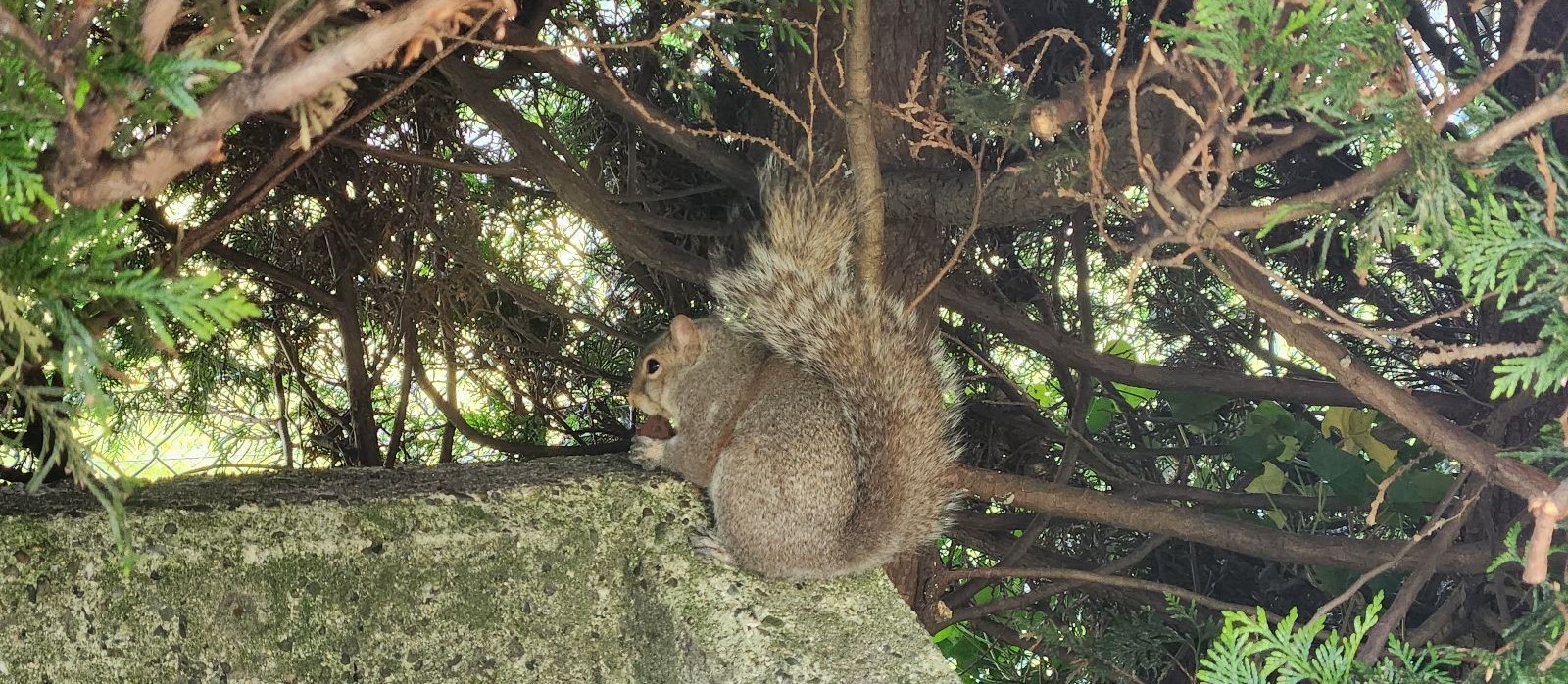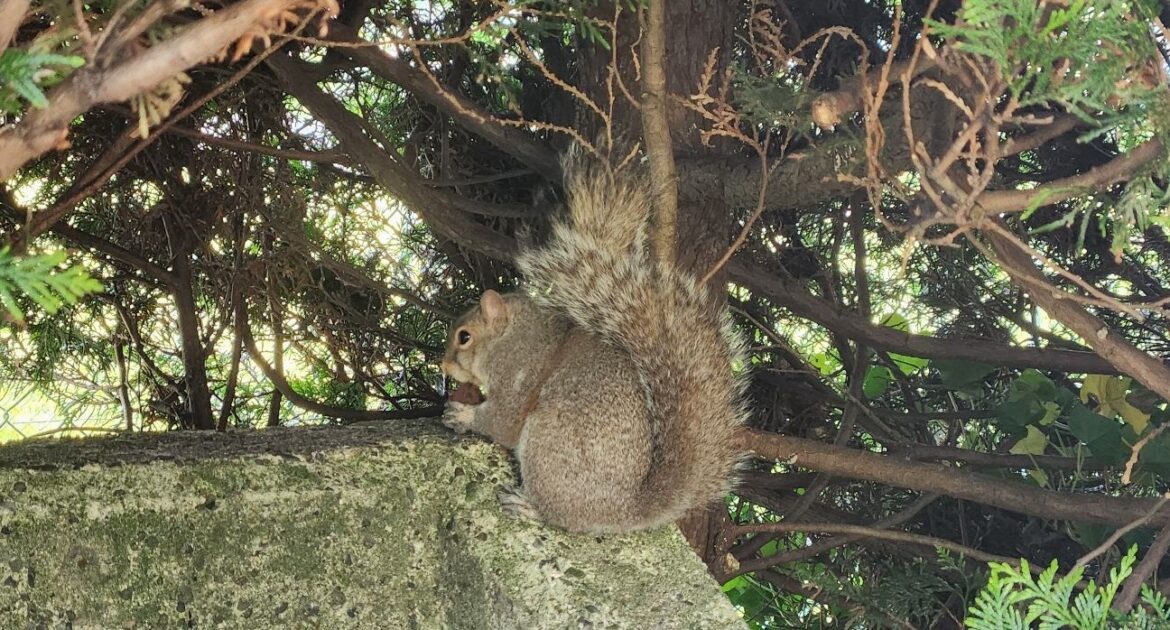Picture this: You’re sitting in your backyard with your morning coffee when a fluffy-tailed squirrel hops onto your deck.
Those big, bright eyes seem to ask, “Got any snacks?” It’s tempting to toss over a handful of nuts or crackers. But before you do, you might wonder: is feeding squirrels safe?
The short answer? You shouldn’t feed squirrels. While it seems like a kind thing to do, feeding these bushy-tailed animals can cause serious problems for both squirrels and people.
Should you feed wildlife at all? Most experts say no. The squirrel feeding risks are much greater than any benefits.
At Skedaddle Humane Wildlife Control in London, we see the problems that come from feeding squirrels every day. When you feed them, you’re not helping – you’re actually putting them in danger. Let’s explore why keeping your snacks to yourself is the best choice for everyone.
Why Feeding Squirrels Seems Like a Good Idea
Many people love watching squirrels play in their yards. These acrobatic animals are fun to watch as they jump from tree to tree and chase each other around. When winter comes, it feels natural to want to help them find food.
You might think you’re being kind by:
- Giving them extra food during cold months
- Helping young squirrels grow strong
- Bringing more wildlife to your yard
- Creating a fun activity for your kids
These reasons make sense. But the truth is that feeding squirrels does more harm than good. Even with the best intentions, you could be putting these animals at serious risk.
The Health Problems Caused by Human Food
Is feeding squirrels safe for their health? Not at all. Human food is terrible for them. Their bodies need specific nutrients that only come from their natural diet of nuts, seeds, fruits, and vegetables they find in the wild.
When squirrels eat human food, they can develop a condition called Metabolic Bone Disease (MBD). This happens when these animals don’t get enough calcium compared to phosphorus. Their bodies start taking calcium from their bones, making the bones weak and brittle.
Common human foods that hurt these animals:
- Bread and Crackers: These have no nutrition for them
- Chocolate and Candy: These can be toxic to them
- Salted Nuts: Too much salt is dangerous for small animals
- Processed Snacks: Chips and cookies cause digestive problems
- Sugary Foods: These lead to tooth decay and obesity
Even foods that seem healthy, like peanuts, aren’t great for squirrels. Peanuts have poor nutrition and can carry harmful mould. If you want to help these animals, the best thing you can do is leave them alone to find their own food.
Creating Dangerous Dependencies
Should you feed wildlife to help them survive? This question misses an important point. Wild animals are called “wild” for a reason – they’re supposed to take care of themselves. When you feed squirrels regularly, they stop looking for their own food.
This creates several problems:
- Loss of Natural Skills: Young squirrels never learn how to find food on their own
- Increased Aggression: Well-fed squirrels become demanding and can bite or scratch when food doesn’t appear
- Overpopulation: More food means more squirrels in one area than the environment can naturally support
- Seasonal Starvation: When people stop feeding them or go on vacation, dependent squirrels may starve
Squirrels that rely on human handouts also pass this behaviour to their babies. Soon, whole families of squirrels expect people to feed them. This breaks the natural balance that keeps wildlife populations healthy.
The Disease and Safety Risks
Squirrel feeding risks extend far beyond the animals themselves. When you feed them, you create health risks for your family and pets, too.
Disease Transmission
Large groups of squirrels gathering around food sources spread diseases faster. These diseases can jump from squirrels to pets and even to humans. Some concerns include:
- Salmonella: Can cause serious stomach problems
- Leptospirosis: A bacterial infection that affects kidneys and liver
- Parasites: Fleas and ticks from squirrels can infest your yard
- Fungal infections: Can cause breathing problems
Safety Concerns for People
Fed squirrels lose their natural fear of humans. This might sound cute, but it creates dangerous situations:
- Aggressive Behaviour: Hungry squirrels may bite or scratch when demanding food
- Property Damage: Bold squirrels break into homes, sheds, and cars looking for food
- Attacks on Children: Small kids are especially at risk from aggressive squirrels
- Pet Injuries: Dogs and cats can be hurt by squirrels protecting their food territory
Environmental and Ecological Problems
Is feeding squirrels safe for the environment? Absolutely not. When you feed wildlife, you disrupt the natural ecosystem in ways that harm many different species.
Overpopulation Issues
Too many squirrels in one area creates serious problems:
- Competition for Resources: Natural food becomes scarce for all wildlife
- Habitat Destruction: Large squirrel populations damage trees and plants
- Reduced Biodiversity: Other species get pushed out by aggressive squirrels
Disrupting Natural Cycles
Nature has its own way of controlling animal populations. Food scarcity during certain seasons naturally limits how many animals an area can support. When humans provide extra food, this system breaks down.
Impact on Other Wildlife
Bird feeders meant for squirrels often attract other unwanted visitors like rats, raccoons, and even bears. These animals can become problems that require professional removal.
Legal and Social Considerations
Many cities and towns have laws against feeding wildlife, including squirrels. These rules exist for good reasons – protecting both people and animals. Breaking these laws can result in fines or other penalties.
Your neighbours might also have strong feelings about wildlife feeding. Squirrels don’t stay in just one yard. When you feed them, you’re essentially inviting them into your entire neighbourhood. This can cause conflicts with people who don’t want squirrels on their property.
What to Do Instead of Feeding
If you love watching squirrels around your property, there are safer and kinder ways to enjoy their presence without putting them or your family at risk. Instead of giving them food, try making your yard a welcoming natural space.
One way to do this is by planting native trees and shrubs that grow nuts and berries, giving squirrels something healthy to find on their own. Letting leaves and branches stay on the ground is also helpful. This creates spots where squirrels and other wildlife can discover insects and natural food.
Set out a shallow dish or birdbath with fresh water for animals to drink from, but remember not to use pesticides in your yard, as these chemicals can be dangerous for squirrels and many other animals.
You can also enjoy their company from a distance, which keeps both wildlife and people safe. Try watching squirrels through your windows or from your deck as they play, collect food, and move about their day. Many people find joy in taking photos of the squirrels and learning about their natural behaviours and seasonal habits.
You can also use these moments to teach children about the importance of respecting wildlife and appreciating these animals without interfering in their lives. This approach lets you build a positive connection with nature while protecting the balance of your local ecosystem.
When Squirrels Become a Problem
Even if you never feed squirrels, they might still decide your property looks like a great place to live. These animals can cause expensive damage when they move into attics, sheds, or other buildings.
If these animals have already moved into your home, don’t try to handle the situation yourself. Professional wildlife control experts have the tools and knowledge to solve the problem safely and humanely.
How Professional Wildlife Control Helps
At Skedaddle Humane Wildlife Control, we understand that homeowners want to coexist peacefully with wildlife. Our approach focuses on solving problems without harming animals.
We use humane methods like one-way doors that allow animals to leave your property but prevent them from coming back. This approach keeps families together while protecting your home from damage.
Our trained technicians also clean and sanitize areas where animals have been living, removing health risks for your family. We then seal entry points to prevent future problems.
Making the Right Choice for Wildlife
Should you feed squirrels? The answer is clear: no. Is feeding squirrels safe? Definitely not. The squirrel feeding risks far outweigh any perceived benefits. Should you feed wildlife at all? Wildlife experts agree that feeding wild animals causes more problems than it solves.
The kindest thing you can do for squirrels is to let them live as nature intended. They’re incredibly good at finding food and taking care of themselves when humans don’t interfere.
If squirrels have already become a problem on your property, don’t wait for the situation to get worse. Contact Skedaddle Humane Wildlife Control in London today to request an estimate. Our team of experts will help you solve wildlife problems safely and effectively, protecting both your family and the animals we all love to watch from a respectful distance.




